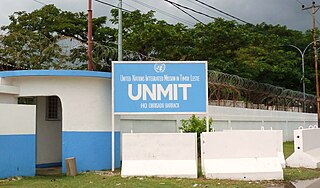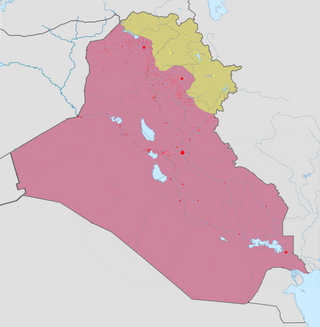
The United Nations Security Council (UNSC) is one of the six principal organs of the United Nations (UN) and is charged with ensuring international peace and security, recommending the admission of new UN members to the General Assembly, and approving any changes to the UN Charter. Its powers as outlined in the United Nations Charter include establishing peacekeeping operations, enacting international sanctions, and authorizing military action. The UNSC is the only UN body with authority to issue resolutions that are binding on member states.

The United Nations General Assembly, UNGA; French: Assemblée générale des Nations unies, AGDNU is one of the six principal organs of the United Nations (UN), serving as its main deliberative, policymaking, and representative organ. Currently in its 79th session, its powers, composition, functions, and procedures are set out in Chapter IV of the United Nations Charter.

The member states of the United Nations comprise 193 sovereign states. The United Nations (UN) is the world's largest intergovernmental organization. All members have equal representation in the UN General Assembly.

The United Nations Interim Administration Mission in Kosovo is the officially mandated mission of the United Nations in Kosovo. The UNMIK describes its mandate as being to "help the United Nations Security Council achieve an overall objective, namely, to ensure conditions for a peaceful and normal life for all inhabitants of Kosovo and advance regional stability in the Western Balkans."

A United Nations Security Council resolution (UNSCR) is a United Nations resolution adopted by the Security Council (UNSC), the United Nations (UN) 15-member body charged with "primary responsibility for the maintenance of international peace and security".
China is one of the members of the United Nations and is one of five permanent members of its Security Council. One of the victorious Allies of World War II, the Republic of China (ROC) joined the UN as one of its founding member countries in 1945. The subsequent resumption of the Chinese Civil War between the government of Republic of China and the rebel forces of the Chinese Communist Party, led to the latter's victory on the mainland and the establishment of the People's Republic of China (PRC) in 1949. Nearly all of mainland China was soon under its control and the ROC government retreated to the island of Taiwan.

A United Nations resolution is a formal text adopted by a United Nations (UN) body. Although any UN body can issue resolutions, in practice most resolutions are issued by the Security Council or the General Assembly, in the form of United Nations Security Council resolutions and United Nations General Assembly resolutions, respectively.

The United Nations Security Council veto power is the power of the five permanent members of the UN Security Council to veto any decision other than a "procedural" decision.
The United Kingdom is a founding member of the United Nations and one of five permanent members of the UN Security Council.

The United Nations Integrated Mission in East Timor (UNMIT) was established on 25 August 2006 by UN Security Council Resolution 1704. Its objectives are "to support the Government in consolidating stability, enhancing a culture of democratic governance, and facilitating political dialogue among Timorese stakeholders, in their efforts to bring about a process of national reconciliation and to foster social cohesion". In its most recent resolution on UNMIT, the Council extended its mandate until 26 February 2012. UNMIT and ISF troops left the country at the end of 2012.

United Nations Security Council Resolution 1737 was unanimously passed by the United Nations Security Council on 23 December 2006.

The African Union-United Nations Hybrid Operation in Darfur was a joint African Union (AU) and United Nations (UN) peacekeeping mission formally approved by United Nations Security Council Resolution 1769 on 31 July 2007, to bring stability to the war-torn Darfur region of Sudan while peace talks on a final settlement continue.

United Nations Security Council Resolution 1969 was adopted unanimously on February 24, 2011; after reaffirming resolutions 1599 (2005), 1677 (2006), 1690 (2006), 1703 (2006), 1704 (2006), 1745 (2007), 1802 (2008), 1867 (2009) and 1912 (2010) on the situation in East Timor (Timor-Leste), the Council decided to extend the mandate of the United Nations Integrated Mission in Timor-Leste (UNMIT) for a year, until February 26, 2012.

The United Nations Supervision Mission in Syria (UNSMIS) was a United Nations peacekeeping mission in Syria, set up in 2012 as a result of United Nations Security Council Resolution 2043 in response to the Syrian Civil War. It was commanded by Norwegian Major General Robert Mood until 20 July 2012 followed by Lieutenant General Babacar Gaye from Senegal. Although observers remain in the country, Mood suspended their mission on June 16, 2012, citing "escalating violence". Observers will conduct no further patrols and stay in their current positions until the suspension is lifted. On 20 July 2012, the Security Council extended UNSMIS for a final period of 30 days. According to resolution 2059, the Council would only consider more extensions in the event that the Secretary-General reports and the Security Council confirms the cessation of the use of heavy weapons and a reduction in the level of violence sufficient by all sides to allow UNSMIS to implement its mandate.

The permanent members of the United Nations Security Council are the five sovereign states to whom the UN Charter of 1945 grants a permanent seat on the UN Security Council: China, France, Russia, United Kingdom, and United States.

United Nations Security Council Resolution 2061 was unanimously adopted on 25 July 2012. It extended the mandate for the United Nations Assistance Mission for Iraq by another 12 months.
The People's Socialist Republic of Albania joined the United Nations on 14 December 1955, and has participated in several UN peacekeeping operations. The current Representative of Albania in the UN is Mr. Ferit Hoxha. Albania is a non-permanent member of the 15-country UN Security Council for the two-year term (2022–2023).

United Nations Security Council resolutions are United Nations resolutions adopted by the fifteen members of the Security Council (UNSC); the United Nations (UN) body charged with "primary responsibility for the maintenance of international peace and security".











